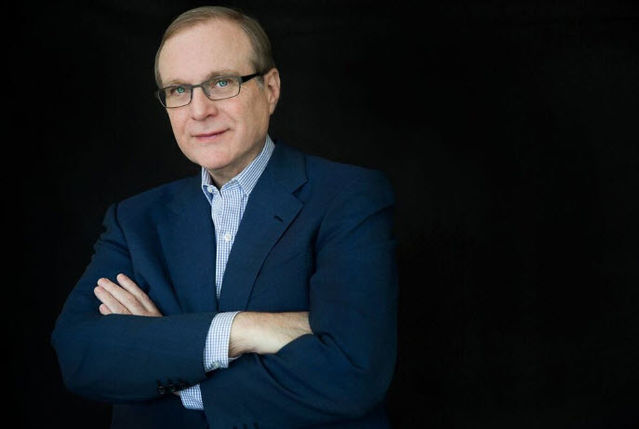Artificial Intelligence
Paul Allen's Immense Legacy
Microsoft co-founder donated billions for innovation in art and science.
Posted October 16, 2018

“The possible is constantly being redefined, and I care deeply about helping humanity move forward.” —Paul G. Allen
Paul G. Allen, Microsoft co-founder, investor, owner of sports teams, billionaire philanthropist, musician, and patron of both the arts and community improvement, passed away on October 15, 2018, at age 65 from cancer complications. Two weeks prior, he had shared that he was being treated for non-Hodgkin’s lymphoma, which had returned after his prior treatment for it in 2009.
Paul G. Allen was born January 21, 1953, in Seattle, Washington. While at Lakeside School, Paul met Bill Gates in 1968. Allen co-founded Microsoft with Gates in 1975. In September 1982, Paul was diagnosed with Hodgkin’s lymphoma. Allen was Microsoft’s chief technologist until 1983, when he left the company. Three years later in 1986, Allen founded Vulcan Inc. with his sister, Jody Allen, in Seattle as an investment and project management firm.
On behalf of Paul G. Allen’s family, Jody Allen released this statement.
“My brother was a remarkable individual on every level. While most knew Paul Allen as a technologist and philanthropist, for us he was a much loved brother and uncle, and an exceptional friend.
Paul’s family and friends were blessed to experience his wit, warmth, his generosity and deep concern. For all the demands on his schedule, there was always time for family and friends. At this time of loss and grief for us—and so many others—we are profoundly grateful for the care and concern he demonstrated every day.”
By 1990, Allen had become a billionaire at age 37.
Allen had a keen love of sports. He owned the Seattle Seahawks NFL team, the Portland Trail Blazers NBA team, and a portion of the Seattle Sounders FC Major League Soccer Club. To Allen’s joy, the Seattle Seahawks won the Super Bowl in 2014.
Allen loved music and art — he was an accomplished guitarist and a patron sponsor of museums and films. In 1988, he restored a theater, the Seattle Cinerama. In 1995 he had an 18.5 percent investment stake in DreamWorks. Allen founded an independent film production company, Vulcan Productions. he opened the Flying Heritage Collection, a private collection of warbirds, in Arlington, Washington in 2004. In 2012, Allen opened the Living Computer Museum in Seattle, an interactive collection of vintage mainframes and machines.
Allen was the financier of SpaceShipOne, which in 2004 became the first privately-based effort to successfully put a civilian in suborbital space, winning the prestigious Ansari X Prize. In 2011, he announced the launch of Stratolaunch Systems to create an air launch to orbit system.
A pioneering technologist, Allen’s legacy is in many areas of science, including artificial intelligence (AI), and neuroscience.
Allen founded the Allen Institute for Brain Science in 2003 in efforts “to accelerate understanding of the human brain in health and disease, supporting the Seattle non-profit with $500 million to date.”
“Over the last decade I have become increasingly interested in the fields of genomics and neuroscience, and their important role in human development, behavior, and health—and ultimately, understanding more about how the brain actually works.” —Paul G. Allen
The inaugural project was the Allen Brain Atlas—a cross-disciplinary endeavor that harnesses neuroscience and genomics to “map the mammalian brain at the cellular level.”
“It’s awe-inspiring how a genome with only 30,000 genes can create the brain—a highly complex system of an estimated trillion nerve cells linked in an extraordinarily intricate network. We conceived the Institute and Atlas projects with a group of eminent neuroscience and genetics researchers, and are funding much-needed research efforts that will have a positive and lasting impact on all areas of brain science. By making the Atlas data accessible in the public domain, and by collaborating with scientific experts around the world, we believe this is a historic opportunity to unite the genome and the brain—and use the data and technology to tackle the challenges of neurodevelopmental, neurodegenerative and psychiatric disease.” —Paul G. Allen
The Allen Brain Observatory has data on “more than 63,000 brain cells from 13 different types of excitatory and inhibitory nerve cells.” The researchers have “looked across six different regions of the mouse visual cortex,” and the dataset now also includes “cells in the deepest layers of the mouse visual cortex.”
In 2013, Allen founded the Allen Institute for the Artificial Intelligence (AI2) with the intent to “explore critical questions in AI.” Two years later in 2015, AI2 launched the first AI-based scientific search engine, the Semantic Scholar, that enables computer scientists to quickly locate academic research papers quickly and more accurately through a simple user interface that optimized for mobile. Built from the “foundation of other research-paper applications such as Google Scholar,” Semantic Scholar deploys natural language processing. It launched with over three million computer science papers and is continuously updated as new papers are published. In October 2017, AI2 announced the addition of “tens-of-millions of biomedical papers” to Semantic Scholar. The AI-based academic search engine developed at the Allen Institute of Artificial Intelligence now covers journals and papers in neuroscience, biomedical science, and computer science. AI2’s current projects include:
- An Incubator for early-stage AI startups
- AllenNLP — an open-source NLP research library, developed on PyTorch
- Semantic Scholar — AI-based academic search engine
- Mosaic — research project on AI common sense knowledge and reasoning
- Aristo — AI that reads, learns, and reasons about science
- Euclid — AI to solve math and geometry problems with natural language input
- PRIOR — AI computer vision
Throughout his lifetime, Allen was a generous person who has donated over $2 billion to support research and innovation in artificial intelligence, neuroscience, science, technology, education, conservation and more causes. Paul G. Allen lived an extraordinary, and full life—his endeavors will leave a lasting impact on humanity now and in the future.
Copyright © 2018 Cami Rosso All rights reserved.
References
Allen Institute. “Founder Paul G. Allen.” Retrieved from: https://www.alleninstitute.org on October 15, 2018.
Vulcan Inc. “Statement On The Death of Paul G. Allen.” Retrieved from: https://www.vulcan.com on October 15, 2018.




